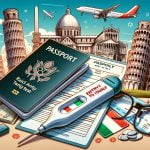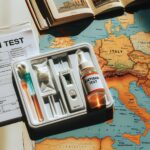As travel continues to resume amidst the ongoing COVID-19 pandemic, it is crucial for individuals to be aware of the testing requirements in place. For those planning a trip to Italy, understanding the specific testing requirements is essential. This article aims to provide a comprehensive overview of the testing requirements for travel to Italy, with a particular focus on the use of rapid antigen tests.
In order to control the spread of COVID-19, many countries have implemented testing measures for travelers. These tests serve as an important tool in identifying and containing potential cases of the virus. There are different types of tests available, including PCR (polymerase chain reaction) tests and rapid antigen tests. While PCR tests have been widely used since the beginning of the pandemic due to their high accuracy, rapid antigen tests have gained popularity due to their quicker results.
Rapid antigen tests work by detecting specific proteins from SARS-CoV-2, the virus responsible for COVID-19. They provide results within minutes rather than hours or days like PCR tests. However, there has been some skepticism regarding their accuracy compared to PCR tests. In this article, we will delve into how rapid antigen tests work, their reliability and discuss whether they meet the testing requirements for travel to Italy.
What is a Rapid Antigen Test?
Rapid Antigen Tests, also known as rapid diagnostic tests (RDTs), are a type of COVID-19 test that can provide quick results, typically within 15 to 30 minutes. These tests detect the presence of specific viral proteins (antigens) from the SARS-CoV-2 virus in respiratory samples obtained from individuals suspected of having COVID-19.
Unlike PCR tests, which detect genetic material from the virus, Rapid Antigen Tests are designed to identify viral proteins. This makes them faster and more cost-effective than PCR tests while still providing valuable information about an individual’s infection status.
While Rapid Antigen Tests may not be as sensitive as PCR tests, they have shown good specificity, meaning they are generally accurate in correctly identifying positive cases. False negatives can occur if the amount of viral antigen in the person’s sample is below the test’s detection limit or if the test is performed improperly.
It is important to note that even with a negative result from a Rapid Antigen Test, it is still possible for an individual to be infected with COVID-19.
For travel purposes, Rapid Antigen Tests offer several benefits. Their rapid turnaround time allows travelers to receive their results quickly before embarking on their journey. Additionally, many countries and airlines now accept Rapid Antigen Tests for entry or boarding requirements due to their ability to detect infectious individuals.
It is crucial to keep in mind that each country may have different requirements regarding acceptable types and validity periods of COVID-19 tests for travel. Therefore, it is essential to familiarize yourself with the specific testing requirements of your destination country, such as Italy’s regulations regarding COVID-19 testing for travelers.
COVID-19 Testing Requirements for Travel to Italy
Italy has implemented strict COVID-19 testing requirements for travelers entering the country. It is important to be aware of these requirements and understand which type of test is acceptable for entry. Italy accepts both PCR tests and Rapid Antigen tests for travel purposes, but it is essential to ensure that the specific type of test meets the necessary criteria.
Italy requires that travelers from most countries present a negative COVID-19 test result upon arrival. The test must have been taken no more than 48 hours before entering Italy. This timeframe applies to both PCR tests and Rapid Antigen tests. It is crucial to note that home-based Rapid Antigen tests are not accepted for entry into Italy.
When it comes to Rapid Antigen tests, it is necessary to ensure that they meet certain standards in order to be valid for travel purposes. The Rapid Antigen test used must have received an Emergency Use Authorization (EUA) or equivalent by European authorities or other national regulatory bodies. These authorized tests must meet specific sensitivity and specificity criteria.
For travelers considering a Rapid Antigen test, it is essential to check its validity and acceptability for entry into Italy with the airline or relevant authorities before traveling. To obtain a valid Rapid Antigen test result, it is recommended to get tested at approved testing centers or clinics where trained professionals administer the test and provide accurate results.
In order to ensure a hassle-free travel experience, individuals planning their trip should consider the availability and accessibility of Rapid Antigen testing in their region or country. Many countries offer widespread access to these tests at various healthcare facilities, clinics, or even through mobile testing units. However, it is advisable to check local resources for specific information on where and how to obtain a Rapid Antigen test.
Taking into account the pricing of Rapid Antigen tests compared to PCR tests is also an important factor when considering travel requirements. Generally, Rapid Antigen tests are more affordable than PCR tests. However, prices may vary depending on the testing location and provider. It is recommended to research different options and compare costs to find the most affordable and convenient option available.
In summary, travelers to Italy must adhere to strict COVID-19 testing requirements upon entry. Both PCR tests and Rapid Antigen tests are accepted, but there are specific criteria that need to be met for the type of test chosen.
It is crucial to obtain a negative test result from an authorized Rapid Antigen test taken within 48 hours of travel. Individuals should ensure the availability, accessibility, cost, and validity of Rapid Antigen tests for travel purposes before making their plans.
Rapid Antigen Test Validity for Travel to Italy
As travelers plan their trips to Italy amidst the ongoing COVID-19 pandemic, understanding the testing requirements is crucial. Italy, like many other countries, has implemented testing mandates to ensure the safety of its residents and visitors. This section will provide detailed information on the validity of rapid antigen tests for travel to Italy, including when to take the test and how long it remains valid.
To meet Italy’s testing requirements, it is important to consider the timeframe for taking a rapid antigen test before travel. The Italian government requires that travelers arriving in Italy from abroad must present a negative COVID-19 test result taken no more than 48 hours prior to their entry into the country. This means that travelers should schedule their rapid antigen tests accordingly to ensure they receive their results in time.
When it comes to the duration of validity for a rapid antigen test specifically for entry into Italy, it is important to note that the test must have been taken within 48 hours of arrival. This timeframe ensures that travelers have been recently tested and provides a more accurate assessment of their current COVID-19 status. It is essential for travelers to plan accordingly and schedule their tests as close as possible to their departure time.
In comparison with polymerase chain reaction (PCR) tests, which are also accepted for entry into Italy, rapid antigen tests have a shorter validity period. PCR tests typically remain valid for up to 72 hours before travel. However, due to the faster turnaround time of rapid antigen tests, they can be a more convenient option for individuals seeking quick results before their trip.
| Test Type | Validity Period |
|---|---|
| Rapid Antigen Test | Within 48 hours of arrival |
| PCR Test | Within 72 hours of arrival |
As travelers plan their trips to Italy, it is important for them to be aware of the validity requirements for rapid antigen tests. By understanding when and how long a test is valid, individuals can ensure they meet the necessary criteria for entry into Italy. It is recommended to check the guidelines and regulations provided by the Italian government or consult with healthcare professionals to stay updated on any changes or updates regarding COVID-19 testing requirements.
Availability and Accessibility of Rapid Antigen Tests
One important factor to consider when planning to travel to Italy is the availability and accessibility of Rapid Antigen Tests. These tests play a crucial role in meeting the country’s COVID-19 testing requirements for entry. Therefore, it is essential to have information on where individuals can obtain a Rapid Antigen Test and whether they are accessible for travelers.
Rapid Antigen Tests can typically be obtained at various locations, including pharmacies, clinics, hospitals, and dedicated testing centers. It is advisable to check with local health authorities or consult online resources, such as official government websites or healthcare provider directories, to determine the nearest facilities offering Rapid Antigen Testing.
When it comes to accessibility for travelers, it is vital to consider availability in different regions or countries. Travelers should find out if their home country has sufficient access to Rapid Antigen Tests or if they need to seek testing options at their destination. It is recommended to research the local testing requirements and facilities in advance to ensure a smooth travel experience.
Having accessibility and availability of Rapid Antigen Tests is essential not only for meeting the entry requirements but also for adhering to any follow-up testing that might be necessary during the stay in Italy. It is crucial to allow enough time before departure and plan accordingly so that travelers can find suitable options for taking the test within the required timeline.
| Factor | Information |
|---|---|
| Locations for obtaining Rapid Antigen Tests | Pharmacies, clinics, hospitals, dedicated testing centers |
| Checking resources | Local health authorities’ information, official government websites, healthcare provider directories |
| Accessibility in different regions or countries | Research local testing requirements and facilities in advance |
| Sufficient time for testing before departure | Plan accordingly to find suitable options within the required timeline |
Cost and Affordability of Rapid Antigen Tests
When considering travel to Italy and the COVID-19 testing requirements, one important factor to consider is the cost and affordability of Rapid Antigen Tests. Rapid Antigen Tests have become a popular option for travelers due to their quick results turnaround time and lower cost compared to PCR tests. Understanding the pricing of these tests, as well as potential insurance coverage or reimbursement options, can help individuals plan and budget for their travel expenses.
Pricing of Rapid Antigen Tests
The pricing of Rapid Antigen Tests can vary depending on several factors such as the testing location, healthcare provider, or even the country where the test is taken. In general, Rapid Antigen Tests tend to be more affordable than PCR tests. The cost of a Rapid Antigen Test can range anywhere from $25 to $150 per test. It’s important to research and compare prices from different providers before making a decision.
Comparison of Costs Between Rapid Antigen and PCR Tests
While Rapid Antigen Tests are generally more affordable than PCR tests, it’s still important to compare the costs between the two types of tests. PCR tests are typically more expensive due to their higher accuracy and sensitivity. The cost of a PCR test can range from $100 to $500 per test.
However, some countries may still require a PCR test for entry instead of a Rapid Antigen Test. It’s essential for travelers to review the specific testing requirements for Italy and make an informed decision based on both cost and acceptability.
Potential Insurance Coverage or Reimbursement Options
Individuals planning their travel should also consider whether their health insurance covers COVID-19 testing expenses. Some insurance providers may cover all or part of the cost for COVID-19 testing, including both Rapid Antigen and PCR tests. It is advisable to check with your insurance provider beforehand to understand the coverage details and any reimbursement options available.
Additionally, certain countries or travel insurance policies may offer reimbursement for COVID-19 testing expenses. Travelers should review their travel insurance policy or contact their insurance provider to determine if such coverage is included.
Tips for Taking a Rapid Antigen Test for Travel to Italy
Taking a Rapid Antigen Test for travel to Italy requires careful preparation and adherence to specific guidelines to ensure accurate results. Here are some essential tips to consider when getting ready for your test:
Step-by-step instructions on how to take a Rapid Antigen Test
- Research testing facilities: Before traveling to Italy, find out where you can get a Rapid Antigen Test in your area. Check with local clinics, pharmacies, or designated testing centers that offer this type of test.
- Schedule an appointment: Due to high demand for COVID-19 testing, it is advisable to schedule an appointment in advance rather than opting for walk-in testing. This will help you secure a time slot that aligns with your travel plans.
- Follow pre-test instructions: Most testing facilities will provide you with specific pre-test instructions that you must follow closely. This may include guidelines such as avoiding food, drink, or smoking for a certain period before the test.
- Collect the sample correctly: Unlike PCR tests that typically require a nasal swab taken by a healthcare professional, Rapid Antigen Tests often use self-collected samples. Be sure to carefully read and follow the instructions provided by the testing facility on how to collect the nasal swab or other required samples accurately.
- Handle and store the sample properly: Once you have collected the sample, make sure to handle it according to the guidelines provided. This may involve placing it in a specific container or ensuring proper temperature control during transportation.
- Timing is crucial: It is important to take the Rapid Antigen Test within the specified timeframe required by Italian authorities for entry into the country. Familiarize yourself with these requirements and plan your test accordingly, ensuring it falls within the acceptable window prior to your departure date.
- Verify documentation: After receiving your test results, double-check that all necessary information is included on any documentation provided by the testing facility. Ensure your name, date of birth, and test result are clearly stated.
Precautionary measures to ensure accurate results
- Follow instructions carefully: It is crucial to carefully read and follow the instructions provided by the testing facility for taking the Rapid Antigen Test. This includes proper sample collection techniques and adhering to any specified storage or handling requirements.
- Minimize contact prior to testing: To reduce the risk of potential exposure before the test, minimize close contact with others, practice proper hand hygiene, and adhere to local health guidelines on mask-wearing and social distancing.
- Consider timing wisely: Taking a Rapid Antigen Test too far in advance of your travel may not meet Italy’s specific timeframe requirements for entry. Conversely, taking it too close to your departure time may not allow enough time for processing and receiving your test results before travelling.
- Validate testing facility credentials: Before scheduling your test at a specific facility, verify that it meets reputable standards for accuracy and reliability. Check if it is authorized or approved by relevant health authorities or accredited agencies.
Recommendations on where and when to take the test
- Choose a certified testing facility: Opt for clinics, pharmacies, or testing centers that are known for conducting reliable Rapid Antigen Tests. Look for facilities that have experienced staff trained in administering these tests accurately.
- Take into account processing time: Some Rapid Antigen Tests provide results within minutes, while others may take longer due to laboratory processing requirements. Consider this when selecting your testing facility based on your travel timeline.
- Allow extra time for unexpected delays: Keep in mind that unforeseen circumstances may arise during the testing process that could potentially cause delays in receiving your test results. Plan accordingly by allowing some additional buffer time before you depart.
By following these tips, you can help ensure a smooth experience when taking a Rapid Antigen Test for travel to Italy. Remember that requirements and guidelines may vary, so it is essential to stay updated on the latest information from official sources and consult with relevant authorities or healthcare professionals if needed.
Beyond Rapid Antigen Testing
In conclusion, while Rapid Antigen Tests can be a convenient and efficient option for travelers to meet the COVID-19 testing requirements for entry into Italy, it is important to consider additional measures for safe travel. While these tests provide quick results and are accepted by Italian authorities, they should not be viewed as a standalone solution.
It is crucial to remember that Rapid Antigen Tests are not foolproof and may have limitations when it comes to accuracy compared to PCR tests. Therefore, travelers should supplement their testing with other precautionary measures. This includes following local guidelines and regulations, practicing good hygiene such as regular handwashing and wearing masks, maintaining social distancing whenever possible, and considering vaccination as an added layer of protection.
Vaccination plays an essential role in minimizing the risk of COVID-19 transmission during travel. Many countries, including Italy, have recognized the significance of vaccinations and have implemented vaccination passports or certificates as a requirement for entry or to access certain venues. It is advisable for travelers to ensure they are fully vaccinated before embarking on their journey.
Additionally, having travel insurance is highly recommended. Travel insurance can provide coverage for unexpected emergencies or medical expenses related to COVID-19. It offers peace of mind knowing that you are financially protected in case of any unforeseen circumstances during your trip.
Frequently Asked Questions
Can you travel internationally with rapid antigen test?
Yes, it is generally possible to travel internationally with a rapid antigen test. However, the specific requirements may vary depending on the country you are traveling to and their entry regulations.
Some countries may accept rapid antigen tests as a valid proof of negative COVID-19 status for entry, while others may require PCR tests or have additional testing protocols in place. It is crucial to check the specific guidelines and requirements of your destination country before traveling to ensure you comply with their regulations.
What is difference between antigen and rapid antigen test?
The main difference between an antigen test and a rapid antigen test lies in the time it takes for results to be obtained. An antigen test detects the presence of certain viral proteins (antigens) produced by the SARS-CoV-2 virus in a sample taken from an individual’s respiratory system. This type of test can be performed using various methods, including laboratory-based tests that can take several hours to provide results.
On the other hand, rapid antigen tests are designed to produce results within minutes, usually using lateral flow technology. While both types of tests detect viral antigens, the speed at which results are generated distinguishes them.
Are there different types of rapid antigen tests?
Yes, there are different types of rapid antigen tests available on the market. Various manufacturers have developed these tests using diverse technologies and methodologies, although most employ lateral flow immunoassay techniques for quick detection of viral antigens. Some rapid antigen tests also rely on different target antigens they aim to detect and require varying specimen types (such as nasal swabs or saliva) for accurate results.
Each test may vary in terms of sensitivity, specificity, ease of use, cost-effectiveness, and regulatory approvals received. Therefore, it is important to select a reliable and authorized rapid antigen test that meets the requirements established by health authorities for accuracy and performance standards.

I’m a passionate traveler, writer, and Italophile. My fascination with Italy’s history, art, and culture has led me on countless adventures across the Italian landscape. Through “I Live Italy,” I share my love for this extraordinary country and aims to inspire others to explore its boundless beauty.





